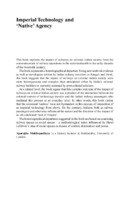Imperial Technology and ‘Native’ Agency
Proposal review
A Social History of Railways in Colonial India, 1850–1920
Abstract
This book explores the impact of railways on colonial Indian society from the
commencement of railway operations in the mid-nineteenth to the early decades
of the twentieth century.
The book represents a historiographical departure. Using new archival evidence
as well as travelogues written by Indian railway travellers in Bengali and Hindi,
this book suggests that the impact of railways on colonial Indian society were
more heterogeneous and complex than anticipated either by India’s colonial
railway builders or currently assumed by post-colonial scholars.
At a related level, the book argues that this complex outcome of the impact of
railways on colonial Indian society was a product of the interaction between the
colonial context of technology transfer and the Indian railway passengers who
mediated this process at an everyday level. In other words, this book claims
that the colonised ‘natives’ were not bystanders in this process of imposition of
an imperial technology from above. On the contrary, Indians, both as railway
passengers and otherwise influenced the nature and the direction of the impact of
an oft-celebrated ‘tool of Empire’.
The historiographical departures suggested in the book are based on examining
railway spaces as social spaces – a methodological index influenced by Henri
Lefebvre’s idea of social spaces as means of control, domination and power.
Keywords
railroads; social aspects; India; history; Bengal; Bengali language; Bengalis; Colonial India; Colonialism; Hinduism; Indian Railways; Rail transportISBN
9781138226685; 9781315397108OCN
1051780514Publisher
Taylor & FrancisPublisher website
https://taylorandfrancis.com/Publication date and place
2018Imprint
RoutledgeClassification
History
Asian history


 Download
Download